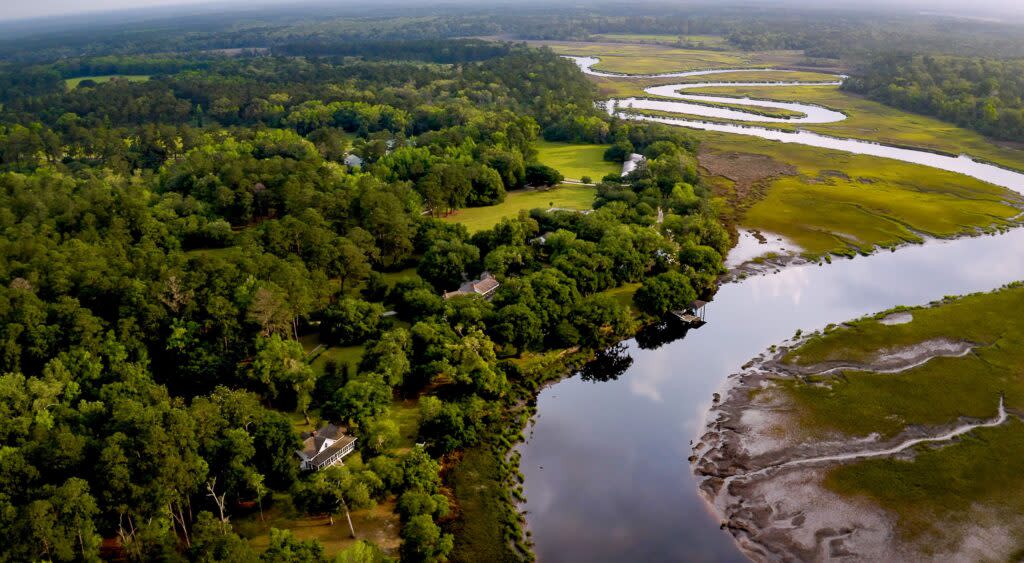4,400 acres near SC military bases, ‘The Patriot’ filming location to be preserved

The Gregorie Neck property along the Tulifinny River. (Provided/Holcombe, Fair and Lane)
COLUMBIA — A 4,400-acre stretch of land in Jasper County and a farm where scenes from “The Patriot” were filmed are set to be preserved with help from state taxes.
A legislative panel approved grants for both properties Tuesday. Altogether, the state will spend $3.6 million to help protect a combined 5,464 acres — a “substantial bargain discount,” Conservation Bank Chairman Michael McShane told the Joint Bond Review Committee.
That adds onto $42.5 million the Conservation Bank has spent this year to protect more than 16,000 acres.
For property called the Gregorie Neck — a significant chunk of land between two rivers and along Interstate 95 north of Parris Island — the approval to spend $2 million puts the final piece of funding into place for partners to forever protect the “heart of the Port Royal Sound watershed,” according to documents provided to the Legislature’s fiscal oversight committee.
For Thrailkill Farms in Chester County, one of the settings in “The Patriot,” the approval marks the beginning of the process to protect the working farm, said Raleigh West, director of the state Conservation Bank.
Gregorie Neck
When 4,400 acres in Jasper County went up for sale last year for the first time in three decades, the fate of the region suddenly came into question: Would a developer buy the land to build new houses? Or would the untouched land remain wild?
Located in one of the state’s fastest-growing regions, the area named for Alexander Gregorie — who bought it in 1798 — seemed prime for development, said David Bishop, a conservation director for The Nature Conservancy’s coastal and Midlands regions.
Officials in Jasper County, facing an existential question over rapid changes, had recently put a moratorium on new development permits. But once that moratorium ends, the land would have faced no zoning protections, according to committee documents.
So, working with a real estate group and landowners selling the property, The Nature Conservancy bought the land in February for $35 million to put it under a conservation easement, permanently prohibiting future development.
“We realized it was going to be developed,” Bishop told the SC Daily Gazette. “We’re not against development, but we didn’t think this was the right spot to develop.”
After finalizing the easement, The Nature Conservancy will split the land and sell it to a maximum of six private owners who largely must keep it natural. But when land has a conservation easement limiting its uses, the value goes down, leaving The Nature Conservancy down millions of dollars.
Money from the state, the Department of Defense and Beaufort County will make up for most of the loss in value. The Nature Conservancy will donate about $4.5 million worth of land to cover the rest.
“We’ll hopefully make our money back so we can do it all again,” Bishop said.
Although buying the property was potentially risky from The Nature Conservancy’s end, “from an ecological standpoint, it was a no-brainer,” Bishop said.
Keeping that area rural gives salt marshes somewhere to go without destroying people’s homes during floods, said Kate Schaefer, director of land protection for Open Land Trust, which will hold the conservation easement.
Both Beaufort County and the nearby Marine Corps Air Station of Beaufort wanted the land to stay rural, offering historic financial support to the groups attempting to preserve it.
“It was a unanimous conservation priority for the region,” Schaefer said.

For the military, keeping the land rural ensures pilots doing test flights have safe, open areas for emergency landings, reducing the risk of them hitting a building, Schaefer said.
Plus, they don’t have to worry about bothering neighbors with loud fighter jets, possibly disrupting operations, West said.
“If you put luxury houses under the flight path of these jets, you’re just asking for noise complaints,” he said.
The U.S. Department of Defense awarded the project $6 million, about a quarter of the total Readiness and Environmental Protection Integration grant funds the agency had to spend last year.
Another $1 million came from Beaufort County’s conservation-specific penny sales tax, which residents adopted in 2022, mere months after a state law allowing it went into place.
Part of the law specified that the money could go toward projects outside a county’s borders. That was what Beaufort County did, offering its neighbor revenue from its local sales tax to protect the land along the Coosawhatchie and Tulifinny rivers, which flow into Beaufort County’s Port Royal Sound. Keeping the land rural will help guard Beaufort County’s water from pollution, Schaefer said.
Because Beaufort was the first county in the state to adopt the new program, this marked the first time a county used its own sales tax collections to protect land outside its borders.
“Beaufort County deserves a lot of credit to understand conservation is regional and the best conservation doesn’t pay attention to arbitrary county lines,” Schaefer said.
Similarly, the land protects water and wildlife in the neighboring ACE Basin, which is about 300,000 acres, and along the Savannah River, which has about 450,000 conserved acres.
Also nearby are the 6,000-acre Mackay Point and 8,000-acre, state-run Coosawhatchie Wildlife Management Area. Because animals and water don’t follow property lines, creating a buffer between natural areas prevents disruptions to the nature there, Bishop said.
Although it’s a comparatively small part of that area, the size of the property sets it apart from most pieces of land that are affordable enough for the state to help preserve, West said.
“There’s just not many opportunities to protect a property of that magnitude left,” West said.
Thrailkill Farms
The legislative committee also approved spending $1.6 million to conserve just over 1,000 acres in Chester County.
Thrailkill Farms, a cattle farm located about 12 miles south of Rock Hill, is most famous for an appearance in the 2000 movie “The Patriot” starring Heath Ledger and Mel Gibson. But the family farm, which was founded in 1909, is also significant agriculturally for its prime farming soil and native hardwood timber, according to committee documents.
Located on the southern fringes of the Charlotte metro area, the risk of encroaching development qualified the farm for a state grant for a conservation easement, West said.
“It’s a great piece of property, a great farm,” West said.
The Thrailkill family approached the state asking for help funding the easement, McShane said. The owners were willing to sell the land for less than half the $3.9 million asking price, allowing the state to help out.
“It was a substantial discount,” West said. “That makes it doable.”
The deal is not yet finalized, but the committee’s approval Tuesday will allow the state to move forward with the funding to allow the Farm Bureau Land Trust to protect the property, West said.
The post 4,400 acres near SC military bases, ‘The Patriot’ filming location to be preserved appeared first on SC Daily Gazette.

